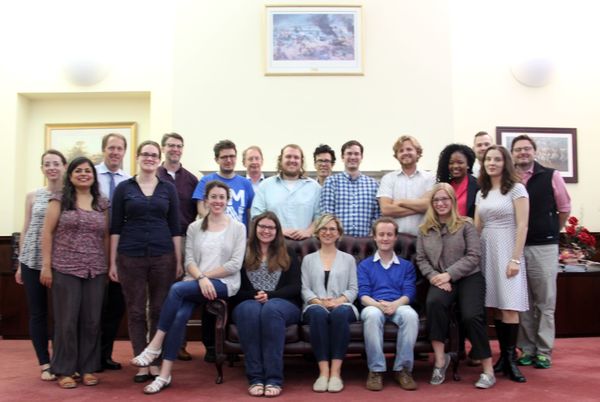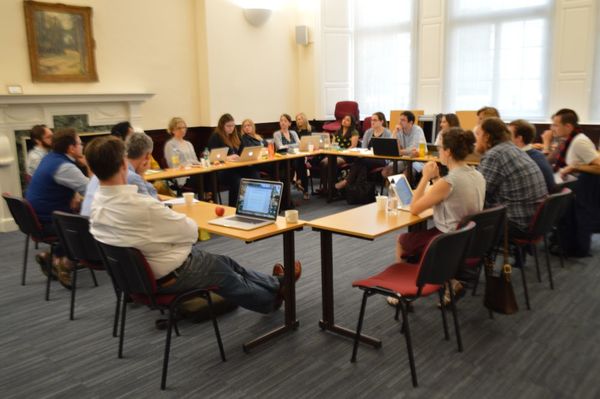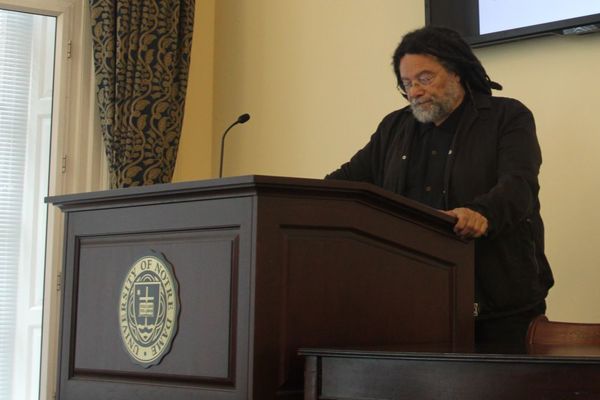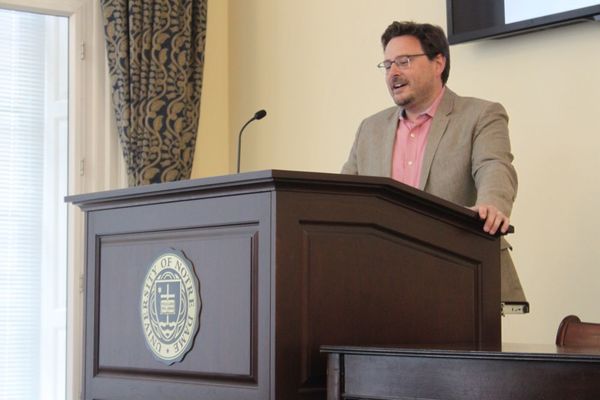
2016 Global Dome Exchange Program graduate students and guest faculty
Over three weeks in July, the London Global Gateway hosted the fourth annual Global Dome Exchange Program, an intensive seminar designed to accelerate dissertation progress and build international networks of young scholars in the humanities.
The program facilitated conversations between 15 graduate students and 18 guest faculty—with diverse interests spanning literature and history—from the University of Notre Dame, University of Oxford, King’s College London, and University of Edinburgh.
Cross-disciplinary conversations
Patrick Griffin, the Madden-Hennebry Professor of History, and Elliott Visconsi, associate professor of English and chief academic digital officer, worked together to create a program that asks students to step back from their immediate work and specialism.
“One of the goals of Global Dome is to have students think about the big questions,” Visconsi said. “Namely, the framing of their projects and the relevance of their intervention within a scholarly enterprise—which they learn to articulate to people beyond their immediate specialization.”
An unusual and defining aspect of the Global Dome Exchange Program is that it enables cross-disciplinary conversations and critique, Griffin said.
“Nobody can play inside baseball. Everyone has to rise above their work,” Griffin said. “The interdisciplinary nature of the program really, in no small part, explains its success.”

A Global Dome Exchange Program workshop
Meaningful intellectual exchange
In daily workshop sessions, students present and discuss early chapters from their dissertations. Aleksandra Hernandez, who studies 19th- and 20th-century American Literature in Notre Dame's Department of English, found this one of the most valuable aspects of the program.
“It’s been really generative to use the experience of critiquing and commenting on others’ work to reflect on my own,” she said. “I had thought that I would just get a lot of useful feedback on the day that I presented, but the real fruit has come from the combination of the two.”
Maria Cecilia Ulrickson, a Ph.D. student in the Department of History, valued the fresh perspectives on her research into colonial Latin American history.
“Even if it’s not your subject area, you can see general arguments and structural points,” she said. “Offering my own comments on others’ work definitely tested my comfort zone. But I realized that the questions I received were not less valid because the individuals offering them were less specialist; they were informed, scholarly questions that had helped illuminate my blind spots.”
Elliott Visconsi finds it refreshing to see, year after year, students’ genuine and reciprocal investment in each other’s work.
“There’s definitely an ethical bond that they seem to develop,” Visconsi said. “They don’t just take feedback and then tune out for a few days—there’s a real sense of meaningful intellectual exchange.”

Paul Gilroy of King’s College London delivers his keynote address
Thoughtful feedback
What Diya Gupta, a King’s College London Ph.D. student, found most useful about Global Dome was hearing from the guest academics about how their research developed.
“You don’t normally get to see that process,” she said.
One of the highlights for Gupta was a lecture by Paul Gilroy, professor of American and English literature at King’s College London, reflecting on his seminal book, There Ain’t No Black in the Union Jack, 30 years after its publication.
Students also benefited from the perspectives of more newly established academics, like Notre Dame's Ian Newman, an assistant professor of English, and Rebecca Tinio McKenna, an assistant professor of history.
“It was nice to see young scholarship modeled,” Ulrickson said. “It helped bring long-term goals into sight and they felt much more achievable.”
It put the project into perspective, agreed Hernandez.
“You realize that you’re learning to become a writer, and that turning your dissertation into book is going to involve a different rhetorical situation. You start thinking about things like titles, and marketing you didn’t necessarily consider before,” she said.
Gupta appreciated the “thoughtful and wide-ranging feedback” she was offered by faculty.
“It definitely helped me to situate myself. What’s more, it was all delivered in an encouraging way and it honestly felt like peer support,” Gupta said.

Elliott Visconsi speaking at Global Dome 2016
International network
Reflecting on this year’s program and the future of Global Dome, Visconsi concluded that it was a great success—at the student, faculty, and institutional levels.
“We’re proud to have built a sturdy international network of leading scholars, and we wish the students the very best in their academic careers,” Visconsi said.
“What’s been wonderful has been the consistent welcome we’ve had here in London. This year has just worked like clockwork. The London Global Gateway team understand exactly what we’re trying to do and there’s a sense that this is our shared project. We look forward to returning next year!”
Originally published at international.nd.edu.


